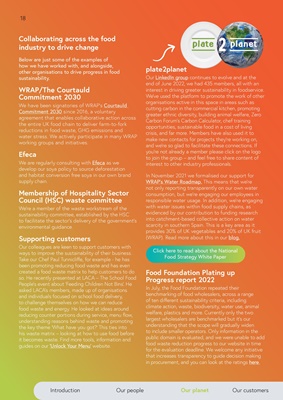
18
Introduction Our people Our customers
Collaborating across the food
industry to drive change
Below are just some of the examples of
how we have worked with, and alongside,
other organisations to drive progress in food
sustainability.
WRAP/The Courtauld
Commitment 2030
We have been signatories of WRAP's Courtauld
Commitment 2030 since 2016, a voluntary
agreement that enables collaborative action across
the entire UK food chain to deliver farm-to-fork
reductions in food waste, GHG emissions and
water stress. We actively participate in many WRAP
working groups and initiatives.
Efeca
We are regularly consulting with Efeca as we
develop our soya policy to source deforestation
and habitat conversion free soya in our own brand
supply chain.
Membership of Hospitality Sector
Council (HSC) waste committee
We're a member of the waste workstream of the
sustainability committee, established by the HSC
to facilitate the sector's delivery of the government's
environmental guidance.
Supporting customers
Our colleagues are keen to support customers with
ways to improve the sustainability of their business.
Take our Chef Paul Tunnicliffe, for example - he has
been promoting reducing food waste and has even
created a food waste matrix to help customers to do
so. He recently presented at LACA - The School Food
People's event about 'Feeding Children Not Bins'. He
asked LACA's members, made up of organisations
and individuals focused on school food delivery,
to challenge themselves on how we can reduce
food waste and energy. He looked at ideas around
reducing counter portions during service, menu flow,
understanding reasons behind waste and promoting
the key theme 'What have you got?' This ties into
his waste matrix - looking at how to use food before
it becomes waste. Find more tools, information and
guides on our 'Unlock Your Menu' website.
plate2planet
Our LinkedIn group continues to evolve and at the
end of June 2022, we had 435 members, all with an
interest in driving greater sustainability in foodservice.
We've used the platform to promote the work of other
organisations active in this space in areas such as
cutting carbon in the commercial kitchen, promoting
greater ethnic diversity, building animal welfare, Zero
Carbon Forum's Carbon Calculator, chef training
opportunities, sustainable food in a cost of living
crisis, and far more. Members have also used it to
make new contacts for projects they're working on,
and we're so glad to facilitate these connections. If
you're not already a member please click on the logo
to join the group - and feel free to share content of
interest to other industry professionals.
In November 2021 we formalised our support for
WRAP's Water Roadmap. This means that we're
not only reporting transparently on our own water
consumption, but we're engaging our employees in
responsible water usage. In addition, we're engaging
with water issues within food supply chains, as
evidenced by our contribution to funding research
into catchment-based collective action on water
scarcity in southern Spain. This is a key area as it
provides 30% of UK vegetables and 20% of UK fruit
(WRAP). Read more about this in our blog.
Food Foundation Plating up
Progress report 2022
In July, the Food Foundation repeated their
benchmarking of food wholesalers, across a range
of ten different sustainability criteria, including
climate action, waste, biodiversity, water use, animal
welfare, plastics and more. Currently only the two
largest wholesalers are benchmarked but it's our
understanding that the scope will gradually widen
to include smaller operators. Only information in the
public domain is evaluated, and we were unable to add
food waste reduction progress to our website in time
for the evaluation deadline. We welcome any initiative
that increases transparency to guide decision making
in procurement, and you can look at the ratings here.
Click here to read about the National
Food Strategy White Paper
Our planet